This year’s ‘Railway Oscars’ proved to be a memorable night for Transport for Greater Manchester, which claimed two major prizes at RAIL’s National Rail Awards at London’s Grosvenor House Hotel in September (RAIL 784).
While the Civil Engineering Achievement of the Year award, for the early delivery of the Metrolink line to Manchester Airport (RAIL 787), may seem to be the more high profile accolade, the second award secured by the regional transport authority is just as significant.
This was the Putting Passengers First award, which went to Transport for Greater Manchester (TfGM) for its innovative Disability Design Reference Group.
One of the key advantages of Metrolink since its inception in 1992 is that the tramway has been built to be fully accessible to all users, whether able-bodied or disabled. Greater Manchester Passenger Transport Executive (as TfGM was then known) wanted to ensure that as many people as possible could easily use Metrolink, and thus the needs of the disabled have been considered at all stages.
During the first phase of Metrolink, which entailed the conversion of two former British Rail lines for use by the new trams, disabled ramps and lifts were installed at station stops, and platforms modified so that level step-free access to the trams was available for wheelchair users and people with lower levels of mobility.
This opened up new travel opportunities to many passengers who up to that point had been largely unable to use the train services that had previously served the routes, in the days before legislation was introduced to make transport operators consider the needs of disabled users.
Making Metrolink a welcoming and useful service to disabled users is just part of TfGM’s aim to make sure that all forms of public transport under its jurisdiction are accessible to as many people as possible.
But rather than simply paying lip service to the various pieces of legislation relating to disabled users, the organisation decided to go further and establish a working group of disabled people who could offer advice and guidance in relation to the expansion of the Metrolink network.
This was a way of establishing the practicalities of delivering such a big project while also considering the needs of disabled users. And the new group would be known as the Disability Design Reference Group (DDRG).
Back in 2008, TfGM tendered for a company to manage the recruitment, training and organisation of the DDRG, which would be tasked with consulting on and informing how access improvements to Metrolink services for disabled users could be applied.
The successful tender was awarded to Breakthrough UK Ltd, a disabled people’s charity that identifies and addresses barriers to the participation of disabled people at all levels of society. The organisation does this by fully involving and working in partnership with disabled people, their organisations and supporters.
Breakthrough recruited a reference group to form the DDRG, representing a range of disability types - consisting of people from differing ethnic backgrounds, men and women, and people from different age groups.
The DDRG’s aims are to provide:
- Balanced, constructive and pragmatic advice based on lived experience.
- Representation and perspectives from a thorough cross-section of impairments.
- Impartiality and transparency.
- Insight into the accessibility of all aspects of the Greater Manchester transport network, which will increasingly be utilised as the group’s remit expands.
- Support and challenge to transport network professionals, architects, planners and others, as applicable.
Each year Breakthrough provides a report detailing its involvement in projects throughout the year. The group also meets on 11 occasions each year, with additional site visits organised when required.
TfGM organises meetings where DDRG members meet with project managers, architects, planners and other stakeholders to discuss any projects that may require their involvement. While the group was initially concentrating on the development of Metrolink, it now also consults on other aspects of public transport in Greater Manchester, such as the construction of new bus interchanges.
Over the past five years, during its £1.5 billion Phase 3 expansion programme, Manchester’s Metrolink tram system has grown significantly. This has included the construction of several new lines across the 57-mile network, with 57 new station stops built.
The DDRG has been actively involved in the design of these new tram stops. All stops are provided with access ramps or lifts, tactile paving, high visibility handrails, disabled boarding points and help points on the platforms. And while most of the new tram stops themselves have reasonably standard designs, the ease of access to the stops has been carefully considered in relation to the geography of the surrounding area.
Once built, and prior to any new line being brought into use, TfGM invites the DDRG to travel by tram to the new station stops, to ensure that all of the station stops are suitable for disabled passengers.
DDRG Facilitator Andy Walker is a wheelchair user. He explains: “Over the past few years we’ve seen dozens of new Metrolink stops opening. Our group has had the opportunity to make sure each and every one of them will meet the needs of people with a range of impairments. The visits take place as the line enters the final stage of a thorough pre-launch process.”
TfGM has also carried out a modernisation programme at all of the older Phase 1 and Phase 2 tram stops, including a major rebuilding of Victoria, St Peters Square and Deansgate-Castlefield station stops in Manchester city centre. All changes to the design of these stops have involved consultation with the DDRG.
And when TfGM was looking to install some additional seating in newer batches of the M5000 trams, the needs of disabled tram users were taken into account. Again, the DDRG was consulted about the changes that were being proposed.
The M5000 fleet will eventually feature 120 units. Trams numbered 3001-3074 were all delivered with 60 seats, but with large areas available for standing passengers, along with areas for the provision of wheelchairs and pushchairs.
However, a frequent comment made about the trams was that there were not enough seats on the M5000s. TfGM therefore decided to try to modify the seating layouts in trams delivered from 3075 onwards, to provide some additional seats without compromising the needs of those passengers who used wheelchairs.
Modified seating configurations were installed inside tram 3024 on a temporary basis, and the DDRG was asked to view the modified tram and travel on it, to give its opinions on how the changes would affect disabled users. After consultation, a new seating layout was agreed for the newer tram orders, providing another six seats on each tram, and 3024 was returned to its standard seating arrangement. Whether the first 74 trams are subsequently modified when the trams come due for refurbishment remains to be seen.
In 2013, the DDRG was responsible for producing a Metrolink Access Guide that supports disabled passengers, allowing them to plan their journeys and giving them relevant information about access arrangements at station stops.
The approach taken by TfGM in developing the DDRG is now recognised as a model of best practice by the Equality and Human Rights Commission.
TfGM Metrolink Director Peter Cushing said: “We’re particularly proud of the work we’ve done with the Disability Design Reference Group to help make Metrolink the most accessible transport system in the region.
“They’ve made an invaluable input to every extension we’ve opened in recent years and I thank them for taking the time to help improve the network for people across Greater Manchester.”
The days when people with disabilities were discouraged from using public transport are now thankfully long in the past. And it is clear that TfGM is determined to do whatever it can to make Metrolink and other forms of public transport an attractive and welcoming experience for everyone.
- This feature was published in RAIL 788 on November 25 2015

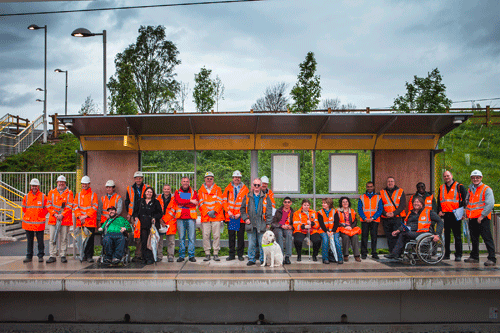
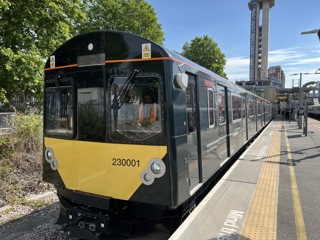
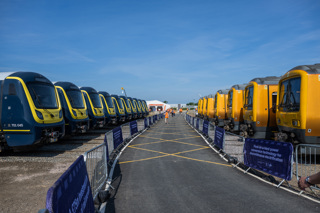
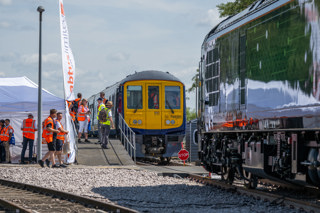
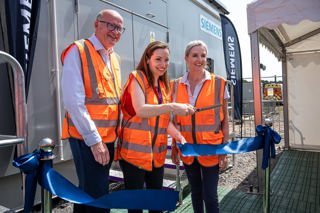
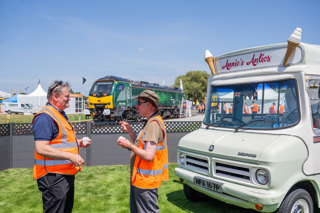











Login to comment
Comments
No comments have been made yet.